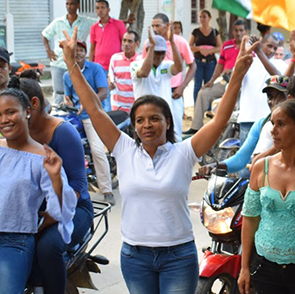Joint Statement - Colombia: Over 2,000 Days of Criminalisation and Persecution Against Milena Quiroz Jiménez, Woman Human Rights Defender in the Region of Sur de Bolívar, Colombia
On August 1, a hearing will take place before the First Court of Cartagena, which will decide on the legality of the evidence that prosecutors in Colombia are using to criminalise the Afro-Colombian woman human rights defender (WHRD) Milena Quiroz Jimenez.
The International Service for Human Rights (ISHR), Front Line Defenders (FLD), the Observatory for the Protection of Human Rights Defenders (OMCT/FIDH), Robert F. Kennedy Human Rights (RFKHR), and Dejusticia call on authorities to cease the criminalisation against the WHRD and guarantee her right to defend human rights.
Milena Quiroz Jiménez is a spokesperson for the Comisión de Interlocución del Sur de Bolívar, Centro y Sur del Cesar, legal representative of the Cooperativa Multiactiva de Arenal (Comuarenal) and the Consejo Comunitario de Comunidades Negras "Resistencia Cimarrona Casimira Olave Arincon Amela". She is also a member of the Fundación Rescate Cultural (FUREC), and is part of the community radio station "La Negrita de Arenal" in the municipality of Arenal, department of Bolivar.
The arrest warrant against WHRD Milena Quiroz was issued in 2017 by the 3rd Prosecutor's Office of the Specialised Circuit of the city of Cartagena. She was charged with the crimes of "rebellion", "conspiracy to commit a crime" and "financing terrorist groups", due to demonstrations she organised as a social leader. When Milena was provisionally released, along with other detained HRDs, the First Criminal Judge of the Cartagena Circuit, Freddy Machado, pointed out that the accusations were not adequately substantiated with evidence, and questioned the actions of the Prosecutor's Office, stating that it rushed "to generate publicity and media coverage instead of structuring a more reasonable indictment".1
Milena Quiroz, along with 11 other leaders and inhabitants of Sur de Bolívar, has suffered reprisals for her work of protest and defence of human rights: arbitrary detentions, a long process of criminalisation fraught with irregularities, unjustified delays, lack of evidence, and non-compliance with due process guarantees.
A control judge in Cartagena ruled that Milena could not remain in her region, so she was forced to establish herself outside of Sur de Bolivar. The judge argued that Milena would otherwise continue to have influence in her municipality, be able to call for marches and be "a danger to society". For this reason, the leader was forced under house arrest far from her family and her territory, preventing her from continuing to defend the human rights of her community.
Furthermore, her hearings have been rescheduled on more than 10 occasions, the Prosecutor's Office has tried to stigmatise her by linking her to guerrilla groups - which increases her risk of being attacked - and her lawyers have been prevented from accessing evidence and interviewing witnesses that allegedly will be used against her, violating her right to a fair trial.
Milena's defence has continuously denounced these irregularities, and a criminal and disciplinary investigation against the prosecutor who promoted the criminalisation is pending. However, since 28 May 2020, more than two years ago, we have been waiting for the judge to rule on the concealment of witnesses and on whether he will reject the prosecutor's evidence. To date, this hasn’t occurred, mostly for reasons attributable to the Prosecutor's Office and the trial court. We hope that at the next hearing, on 1 August 2022, this decision will be announced, pointing out the illegality of the evidence intended to be used against Milena and respecting her rights.
The continuation of the criminalisation process would further increase the stigmatisation suffered by the WHRD and the risk of new attacks against her, as illustrated by the assassination attempt she suffered in December 2019, despite having protection measures from the National Protection Unit (UNP), or the lamentable murder of Teófilo Manuel Acuña, on 1 March 2022, criminalised along with Milena.
Milena's case is part of a broader context of persecution and violence against HRDs in Colombia. According to Front Line Defenders, in 2021, 138 social leaders and HRDs were killed in the country, making it the deadliest country in the world for the exercise of the right to defend human rights. Women defenders and leaders live in a particular situation of risk, and in recent years there has been an increase in murders, torture, sexual violence and threats against community leaders and defenders.2
In light of the above, the undersigned organisations:
- Call on Colombian judicial authorities to examine in detail and consider the irregularities pointed out in the process against Milena Quiroz and, consequently, drop the charges and the criminalisation process against the defender.
- Call on the Colombian government to ensure an enabling environment for the work of HRDs, guaranteeing their physical integrity and that they are not stigmatised and criminalised for their actions.
- Call on the national and international press to attend the hearing as observers of the arbitrary process that Milena is suffering for defending human rights.
- Call on the international community and diplomatic delegations and embassies in Colombia to monitor this process and make a statement calling for an end to the criminalisation, violence, and persecution against Milena Quiroz Jimenez and against people who defend human rights in the country.
1First Criminal Court of the Circuit of Cartagena, in charge of hearings, 7 November 2017, Record No.13001-60-01129-2015-03910-00, unofficial transcript.
2Inter-American Commission on Human Rights, Report on the Situation of Human Rights Defenders and Social Leaders in Colombia, OEA/Ser.L/V/II. Doc. 262, 6 December 2019, para. 69.

